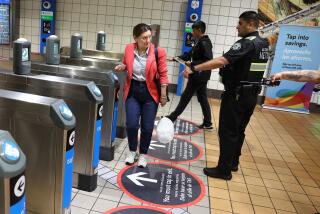Streamlined Check-Ins May Be Tested
- Share via
WASHINGTON — Streamlined airport check-in for travelers who have passed a background investigation could get a test as early as next year, after a congressional agency determined that the approach might improve security.
The General Accounting Office, in a report to be released today, concludes that a so-called “trusted traveler” program would be feasible, but many practical questions must first be answered. Airlines are clamoring for such a program to woo back frequent business travelers turned off by high ticket prices and security hassles.
Prompted by the GAO findings, Sen. Kay Bailey Hutchison (R-Texas) plans to call for a test of the concept as early as next year at several airports, her office said. Hutchison is expected to chair the Senate aviation subcommittee next year.
“A registered traveler program offers potential for improving security and reducing inconvenience to participating travelers,” says the GAO report, a copy of which was obtained by The Times.
Fearing that terrorists could infiltrate the program, the Transportation Security Administration had initially opposed special treatment for low-risk passengers. However, the agency has now reversed course and set up a Registered Traveler Program Office to study the concept and plan for its possible implementation. Tom Ridge, who was nominated by President Bush today to head the new Homeland Security Department, was an early advocate of the idea.
The program would be voluntary, so those concerned about government intrusion into their private lives would be under no obligation to apply.
A “trusted” or “registered” traveler would have to pass a background check before being issued the high-tech identification card that would allow access to express security lanes.
The card would incorporate a “biometric identifier” such as a fingerprint or a measurement from the eye or hand. A special machine would read the card and match it to the traveler.
At peak travel times like Thanksgiving week, trusted travelers could clear security in a matter of seconds. They would still have to pass through a metal detector and put their carry-on luggage through X-ray machines, but they would be spared more intrusive searches.
“According to TSA officials, the agency is willing to consider some differentiated security procedures for program participants,” the report says.
Theoretically, passengers left in the standard security lanes would also benefit, because many frequent fliers would have been culled from their lines.
A minority of passengers who travel often account for a large share of the people at airports, statistics show.
The two-tiered approach to security could also improve protection for all passengers because fewer resources would have to be expended searching low-risk travelers.
Several countries, including Israel, Great Britain and the Netherlands, have trusted traveler programs at key international airports. U.S. immigration authorities use the same concept at certain crossings on the Mexican and Canadian borders to expedite passage for workers.
One issue that would have to be addressed before the program can be extended to air travelers is who would pay. A background check can cost up to $150 per individual, the GAO report estimates. Frequent fliers would be willing to pay up to $100 to enroll, and $25 to $50 annually for renewal, according to airline officials. Many business travelers would likely be able to pass the cost on to their companies.
The government would have to spend about $10 million to set up a test of the system at six airports, a congressional official said. Hutchison, who is also a member of the Senate Appropriations Committee, intends to press for the funding.
The GAO recommended that federal authorities test the concept on a small scale, after closely studying the experience of other countries. Such a test would help address security-related concerns and provide a sense of how popular the program might be among travelers. The government should select a single technology for use at all airports, and should develop performance measures to monitor and evaluate the program, the GAO recommended.
Although the idea sounds straightforward, it raises many thorny questions. Among them:
Should the program be limited to U.S. citizens only? What infractions or characteristics would deny someone a trusted traveler card? Would there be any right to appeal the denial? Would the information gathered in background investigations be used solely for airport security, or could it be shared with other law enforcement agencies or used for commercial purposes? Would children be allowed to use the express lane with their cardholding parents? Would the federal government be financially liable if a trusted traveler committed a terrorist act at an airport or on a plane?
The answer to many of the questions involves trade-offs that could affect civil and privacy rights.
For example, limiting the program to U.S. citizens would simplify the background checks, by making it easier to verify information. One option calls for initially allowing only U.S. passport holders to enroll. But that would automatically exclude law-abiding, taxpaying immigrants.
“Concern was expressed that certain races and ethnicities, mainly Arab Americans, would be systematically excluded from program participation,” the report says.
Some experts interviewed by the GAO expressed concern that the card could become a prelude to an internal passport, such as those required in totalitarian countries.
“Civil liberties advocates ... were particularly concerned about the potential for such a program to lead to the establishment of a national identity card,” the report says. Nonetheless, the trusted traveler idea appears to be on the verge of going forward. Congressional officials say there is broad support among lawmakers, industry and groups representing frequent fliers.
More to Read
Sign up for The Wild
We’ll help you find the best places to hike, bike and run, as well as the perfect silent spots for meditation and yoga.
You may occasionally receive promotional content from the Los Angeles Times.






